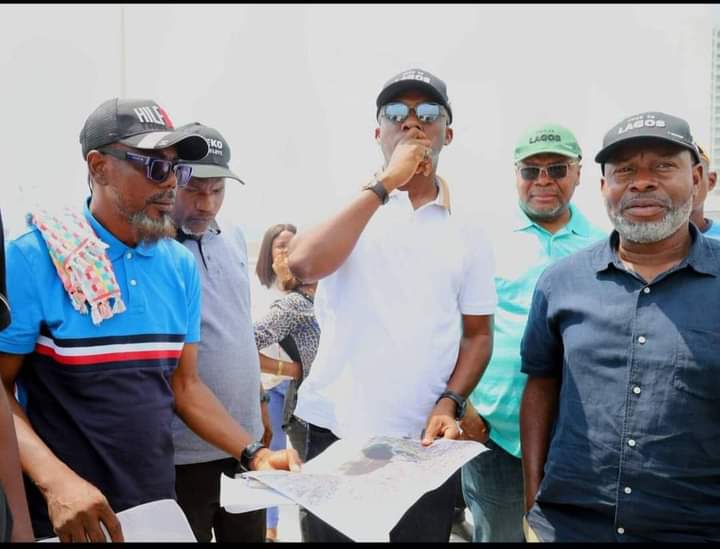By Babajide Fadoju
Tokunbo Wahab, Lagos State’s Commissioner for Environment and Water Resources, has the monumental challenge of keeping one of Africa’s largest and busiest cities clean, orderly, and safe. This purpose is critical for a city with a population of over 16.5 million people, where urban difficulties such as pollution, overcrowding, and illegal settlements make meeting environmental norms a constant battle.
Wahab’s approach, which combines strong enforcement with public awareness, intends to improve Lagos’ quality of life for the long term.
Under Wahab’s guidance, the Lagos State Environmental Sanitation Corps (LAGESC) has launched a campaign to eliminate unlawful settlements and shanties throughout Lagos.
One of these actions took occurred under the Elegbata Bridge in Apongbon, where unauthorised immigrants had established makeshift dwellings.
These locations are frequently fraught with safety and sanitation hazards, jeopardising the well-being of both the occupants and the neighbouring community.
Wahab’s updates on X (previously Twitter) provide real-time updates on these activities, reinforcing the idea that maintaining public areas is a top priority for his government.
By eliminating unlawful settlements, he hopes to improve the city’s beauty while simultaneously reducing the pollution and hazards connected with unregulated urban regions.
The cleanup programs focus on a wide range of places where unauthorised activity have jeopardised public health and safety. Illegal communities frequently lack basic sanitation, causing severe environmental contamination.
Waste and sewage accumulate, creating situations that endanger the health of not only people who live in these places, but also those in nearby communities. Furthermore, these communities are frequently subject to accidents, fires, and other risks, particularly in high-traffic places such as bridges.
Wahab’s efforts to remove squatters are part of a larger strategy to restore order and safety in these areas. In a metropolis as densely populated as Lagos, such measures are critical to promoting a healthy urban environment.
Population pressure is one of the greatest challenges facing Lagos. Rapid urban migration has brought millions to the city in search of better opportunities, but this influx has strained existing infrastructure and resources.
Limited affordable housing options mean that many people, especially those in low-income brackets, resort to setting up homes in public or unauthorized spaces. Wahab’s approach addresses this issue by regulating these spaces, though a longer-term solution will likely require the development of more accessible housing options. By dislodging squatters, Wahab’s administration works to prevent misuse of public spaces and alleviate some of the environmental strain caused by overpopulation.
Beyond removing illegal settlements, Wahab’s efforts include enforcing road safety and encouraging the use of pedestrian bridges. This strategy is vital in a city with such heavy traffic and high rates of pedestrian activity.
By deploying officials to monitor crossings and ensure the use of designated pedestrian bridges, Wahab’s team reduces accidents and enhances public safety. Such measures reflect a commitment to order, underscoring his belief that a cleaner, safer Lagos is achievable through consistent enforcement of environmental and safety regulations.
Wahab’s campaign is aided by collaboration with local law enforcement and other state entities. Multiple departments collaborate to enforce environmental laws and solve public safety issues, which broadens the reach and efficacy of cleanup efforts. The results of these synchronised efforts are obvious throughout Lagos. Residents are starting to see cleaner, more organised public spaces and enhanced urban infrastructure. Wahab’s strategic leadership is gradually altering the landscape of Lagos, revealing glimpses of a city that prioritises cleanliness, order, and communal well-being.
The outcomes of Wahab’s initiatives are tangible. His initiatives to restore public places and reduce pollution improve inhabitants’ health results. Cleaner public areas mean fewer health risks and a slower spread of diseases caused by filthy living situations. Additionally, Lagos’ appearance is improving. A more organised, clutter-free cityscape improves Lagos’ visual appeal and increases its potential as a lively, modern metropolis. This, in turn, may attract more people, enterprises, and investment, boosting the city’s economic growth and development.
However, keeping Lagos clean is not a one-time project; it is a continuing effort that will necessitate ongoing dedication. As Lagos develops, so too will its environmental challenges. Wahab’s approach, with its focus on vigilance and strict enforcement, is designed to address both immediate concerns and set the groundwork for a cleaner future. The long-term vision for Lagos involves not only dislodging illegal settlements but also providing viable alternatives and devising policies that promote sustainable urban living. This comprehensive approach reflects Wahab’s understanding that a genuinely clean city depends on systemic change and the active participation of its residents.
Wahab’s endeavour to keep Lagos clean is one that rests on vigilance and proactive governance. In the face of considerable challenges, he remains steadfast in his efforts to protect the environment and create a city that its residents can take pleasure in. His work emphasises the need for leadership that values order, public safety, and environmental sustainability. For Tokunbo Wahab, maintaining Lagos’s hygiene is not just a goal but a responsibility that he embraces with unwavering dedication. Through strategic action, collaborative partnerships, and a commitment to the welfare of Lagosians, Wahab is steering the city towards a future where cleanliness, safety, and urban attractiveness are the norm.

